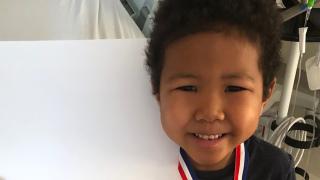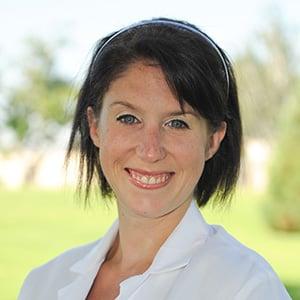Aiden Anderson, a happy, active, inquisitive and rather talkative 7-year-old, likes to stare into the web camera, closer and closer, until all you see is his left eye. Typical kid.
Ever-smiling, he’s excited about his upcoming birthday. Just not for the reasons you might expect.
“It’s going to be 100 days since my transplant!” he points out.
When he was 5, this normally high-octane kindergartener started feeling tired. His school noticed. A nurse thought Aiden’s belly looked distended. She sent him home. Within hours, Aiden’s father was forced to take him to the hospital.
It didn’t take long for tests to reveal the problem. Aiden had a slow-moving case of chronic myeloid leukemia, extremely rare in children — barely 100 cases are reported each year in the U.S. The news stunned Chris Anderson, Aiden’s father.
“It was so shocking, I fainted,” said Chris.
“I couldn’t process it,” recalled Ann Anderson, Aiden’s mom. “I thought they must be wrong.”
Chris rode with Aiden to a local hospital, where he stayed with him for 5 days while Aiden’s symptoms – an inflamed spleen and liver – subsided.
Later, a biopsy discovered evidence of a malignant “blast”: a sudden, rapid growth of cancer cells, mimicking the more dangerous acute myeloid leukemia but less likely to respond to standard chemotherapy used for AML. Aiden would need a stem cell transplant at City of Hope. Soon.
“It was just so surreal. I never thought we’d ever be in that situation. I think I cried through that entire meeting,” said Ann, crying as she tells the story. She remembers how Aiden stayed calm, asking only one thing. “He wanted to make sure we’d be there with him,” she said.
You really never know when or how fate may step in, but at this point two utterly stunning things happened. One dramatically increased the odds of a successful transplant. The other might have derailed it entirely.
Aiden’s mom is Chinese; his dad is African-American. It can be nearly impossible for biracial families to find a compatible, unrelated stem cell donor. The Andersons didn’t even have to look. Aiden’s big brother Ian turned out to be a perfect match.
Transplant scheduled
“Ian volunteered to be Aiden's donor as soon as he learned he was a 100% match,” said dad Chris. “There was no coaxing and pleading on our part. Despite knowing what was involved, he was ready to help immediately.”
First, Aiden went through four weeks of chemotherapy, then another month of immunotherapy to shrink that “blast.” Next would come 11 sessions of radiation and more chemo to eliminate the remaining diseased bone marrow. Everything looked good, with the actual stem cell procedure on track for spring 2020.
Then fate dropped the other shoe.
The COVID-19 pandemic.
Virtually overnight, life at hospitals across the country and around the world flipped upside down. Entire floors were set aside to treat the desperately ill. Hospital ships arrived. Overflow wards went up in public parks. And if you weren’t ill, it became dangerous to venture anywhere near those places. Priorities changed. Elective surgery? Forget about it.
After all those drugs, Aiden was already immuno-compromised. Would his transplant have to wait?
Not a chance, his doctor insisted.
“We didn’t delay anything,” said pediatric hematologist and oncologist Nicole Karras, M.D., assistant clinical professor of pediatrics at City of Hope. “Cancer can’t wait. If you delay, there’s always a risk the cancer will come back, and the more cells that return, the harder they are to treat.”
But some things would be different from now on.
Aiden’s smile vanishes when he remembers the four coronavirus tests he endured — with that long, irritating nasal probe — because it was feared he might have been exposed at different steps along the way. Always brimming with questions for the hospital staff (“Every single nurse at City of Hope knows the Aiden Experience, laughed Mom) he now had just one: Why so many tests? “It’s not fair,” he lamented. He tested negative all four times.
“He had more COVID-19 tests than anyone I know!” said Karras.
Mom got tested too, as did Dad ... and Ian, who now wouldn’t be allowed to visit the kid brother whose life he was saving. All tested negative. As the pandemic grew, City of Hope tightened the rules. Masks on everyone. Temperature screenings. And only one visitor per patient, Mom or Dad, not both. And you couldn’t go home. Not for the entire 45 days Aiden was scheduled to be there. (Some of these rules were later relaxed on a case-by-case basis; ultimately, the hospital permitted Ann and husband Christopher to take turns visiting.)
Chris Anderson took family leave from work and became Aiden’s teacher while he was too sick to go to school.
Adapting to the evolving changes left Mom temporarily “floored.” But how the people at City of Hope handled it all left her permanently impressed.
“It was so calm at City of Hope,” she remembers. “Even though it was so crazy outside. The staff was phenomenal. They were so kind. It brought me a lot of peace. Even when Dr. Karras explained that Aiden may not be able to have children ...”
The tears are flowing again.
“As an educator [she’s an assistant principal, Christopher’s a math teacher], you want to treat the children as if they’re your own. Everyone at City of Hope treated Aiden like he was their son.”
Aiden’s experience is being replicated across the City of Hope campus, which, as a self-contained center whose Emergency Department is exclusively for its own patients, has not received a barrage of coronavirus cases (the handful who do test positive are isolated in a remote area). Cancer treatment has continued uninterrupted, with multiple safety and security enhancements added, making it possibly one of the safest places for a cancer patient to be.
“This is the reality,” asserted Karras. “This virus isn’t going away. People shouldn’t panic. It’s more important for cancer patients to get their proper treatment.”
It was the right call for Aiden, who’s headed for that big birthday in very good shape. Karras calls Aiden “a trouper” and says “it was a pleasure to take care of him.” What does Aiden say?
“He wants to be a doctor,” Mom says.
He has a bit of advice for anyone who might be concerned about coming to City of Hope during this challenging time.
“It’s gonna be OK,” he says reassuringly. “The nurses and doctors will take very good care of you!”

